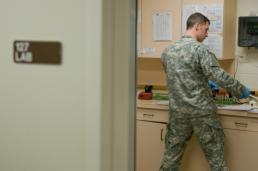Texas Medical Command strives for speedy health assessments
Story by: Sgt. Josiah Pugh
Posted On: February 8, 2016
 Sgt. Josiah Pugh
Sgt. Josiah Pugh
A medic processes recently drawn blood as part of a required periodic health assessment at the Texas Medical Command clinic at Camp Mabry, Austin, Texas, Feb. 6, 2016. This assessment measures a number of aspects of a Soldier’s health including laboratory work, hearing, vision and dental. (U.S. Army National Guard photo by Staff Sgt. Josiah Pugh/Released)
AUSTIN, Texas - Keeping Texas Guardsmen healthy and mission-ready is a full-time job. The troops at Camp Mabry's Texas Medical Command understand the importance of efficiency and cooperation, especially when it comes time to process whole units through their clinic.
On drill weekends, the Soldiers at the Texas Medical Command can be found at the medical clinic at Camp Mabry helping troops from other units complete their required annual periodic health assessments. This assessment measures a number of aspects of a Soldier’s health including laboratory work, hearing, vision and dental.
The staff at the clinic can be stretched thin at times, with many of them frequently offsite supporting the medical needs of various unit missions around Texas. The staff can dwindle to as few as ten in number and the patients in need of processing can reach as many as 100 - all of whom will complete the health assessment in a single day.
“We can be here pretty late,” says clinic Non-Commissioned Officer in Charge Sgt. 1st Class Evangelina Garcia.
Despite all the preparation these medical staff undergo, often it’s the patients they see who hold up the line. The entire process can be as quick as a couple of hours or stretch out to last an entire day. Garcia says the number one reason why lines get backed up is when patients drop in without first going through their command.
“They have to schedule through their medical readiness NCO, get them on our schedule and do their online portion and things will go a lot smoother,” she explains.
The clinic sees its fair share of patients over 40 years of age who must fast overnight to accurately test their blood glucose levels. Sometimes patients will not follow the rules closely and drink caffeinated energy drinks or coffee the morning before their blood drawl. This skews the results and can negatively reflect on the individual’s medical record or require blood to be drawn again on another day.
“Even a healthy person can be flagged, which can go on your record,” said Sgt. Jennifer Hess, a medic with the TMC.
Another common issue the clinic sees is often patients will not bring proof of getting an influenza vaccination through their civilian doctors. When they come to the clinic and MEDPROS lists them as not having the vaccination, they will be required to get a second shot.
Frequently, patients who wear contacts will fail to bring their prescribed eyeglasses. The clinic needs to test eyesight with and without glasses. If a patient does not bring their glasses, the physical health assessment cannot be properly completed.
Aside from having all your paperwork ready when you come in, Garcia says, “be flexible. The biggest thing is you have to be flexible.”
When asked how they get all of their patients’ assessments finished as quickly as possible, Hess said, “We work really well as a team – as an entire unit. We try our best to get people in and out. We’re a great team. Everyone pitches in and does their part.”
Properly scheduling periodic health assessments and preparing for a visit to the clinic can help the entire process flow smoothly and keep troops deployment ready.